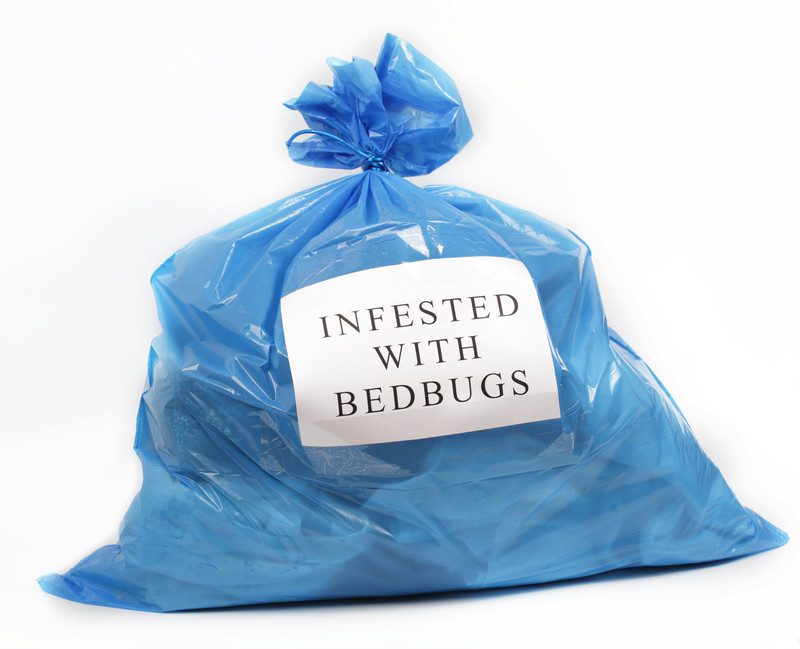Highlights from Arizona Senate Bill 1306 (2011)
By Jeff Sorg, OnlineEd Blog
(April 30, 2019)
 (OnlineEd) – Arizona Senate Bill 1306, passed in 2001, assigns specific responsibilities for bedbug control to landlord and tenants of multifamily housing.
(OnlineEd) – Arizona Senate Bill 1306, passed in 2001, assigns specific responsibilities for bedbug control to landlord and tenants of multifamily housing.
Landlord Responsibilities:
- Keep the dwelling unit free of a bedbug infestation
- Provide tenants with a copy of the landlord’s responsibilities as outlined in SB 1306 on commencement of each lease
- Provide educational materials to tenants, including:
- Measures to prevent and control bedbugs.
- General information about bedbugs and a description of their appearance.
- Information about risk factors for attracting bedbugs such as:
- used or discarded mattresses;
- used or leased furniture;
- pre-owned clothing; and
- traveling without precautions to prevent transferring bedbugs back to the dwelling.
- Information provided by the US Centers for Disease Control and Prevention and other Federal, State or Local health agencies.
- Information provided by nonprofit housing organizations.
- The landlord cannot enter into a lease with a tenant for a dwelling that has a known bed bug infestation.
- Within seven business days after receipt of a written or electronic notice of a possible bedbug infestation from a tenant, the landlord or their licensed pest control operator shall visually inspect the unit for bedbugs and within seven business days after finding evidence of an infestation, the landlord will start a mitigation process in the unit.
- Unless the landlord is a licensed applicator, the landlord shall not use any pest control techniques that constitute mitigation and shall use a pest control applicator who is licensed according to Title 32, Chapter 22.
- The landlord will provide the tenant with written notice of the bedbug mitigation treatment protocol at least three business days before the initial treatment. Notice shall be deemed received by the tenant on the date the notice is personally delivered or mailed first class.
- Unless otherwise provided in this section, the landlord is responsible for the bedbug mitigation expenses for the dwelling unit and any surrounding units that are infested.
Tenant Responsibilities:
- The tenant shall maintain the dwelling unit free of an infestation of bedbugs.
- The tenant shall not move materials into a dwelling that are infested with bedbugs.
- A tenant who knows of the presence of bedbugs will provide the landlord written or electronic notification within three business days of discovering the presence of bedbugs. Notice provided by the tenant constitutes permission to the landlord to enter the dwelling for the sole purpose of inspecting for or mitigation of the bedbugs.
- After receiving notice from the landlord of a bedbug inspection or mitigation, the tenant shall allow the landlord and the landlord’s licensed pest control applicator access to the dwelling.
- The tenant shall comply with the bedbug mitigation protocol established by the licensed applicator, which may include pretreatment activities, temporary evacuation of the dwelling, posttreatment operations and an obligation to report the ineffective treatment or reinfestation to the landlord within three business days.
- The tenant shall not apply or allow any unlicensed person to apply any bedbug control techniques that constitute mitigation.
If a landlord fails to inspect and, if necessary, mitigate an infestation, the tenant can give written notice to the landlord of the tenant’s intention to correct the condition, at the landlord’s expense. If the landlord fails to correct within ten days after being notified, the tenant can order the work to be done by a licensed pest control applicator, submit to the landlord an itemized statement for the pest control services and deduct from any rent due the actual and reasonable cost of the pest control treatment not to exceed five hundred dollars or one-half of the monthly rent, whichever is greater. If the tenant fails to comply with any of their obligations, the tenant may be held financially responsible for bedbug mitigation expenses for the dwelling and surrounding units that are also infested.
This law is for multi-family units. Landlords and tenants of single-family units are advised to work out their own agreement before when negotiating their agreements.
For additional information, please see the entire text of Arizona Senate Bill 1306.
###
OnlineEd blog postings are the opinion of the author and not intended as legal or other professional advice. Be sure to consult the appropriate party or cited documents when professional advice is needed.
For more information about OnlineEd and their education for real estate brokers, principal brokers, property managers, and mortgage brokers visit www.OnlineEd.com.
All information contained in this posting is deemed correct as of the date of publication, but is not guaranteed by the author and may have been obtained from third-party sources. Due to the fluid nature of the subject matter, regulations, requirements and laws, prices and all other information may or may not be correct in the future and should be verified if cited, shared or otherwise republished.
OnlineEd® is a registered Trademark



